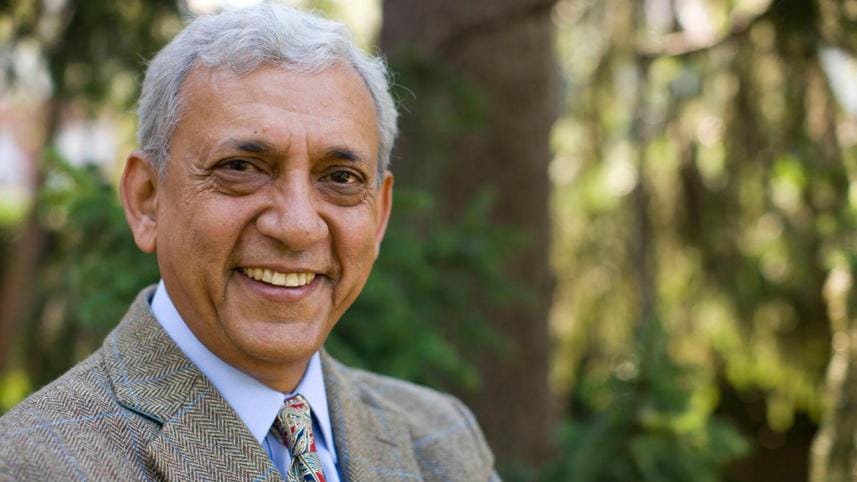Failure to sign Teesta deal a major setback

Failure to sign the Teesta River Water Sharing Agreement was a major setback for Bangladesh, Prime Minister's International Affairs Adviser Gowher Rizvi said yesterday.
“Obviously, our failure to sign the Teesta agreement has been a major setback. Not because we have been deprived of water, but the very feeling that we could not sign an agreement has created a feeling in Bangladesh,” he said.
In response to a former Indian diplomat's comment on the deal, the adviser said, “I agree that it is not a question of sharing of water, but of management. And that is why during the last visit of the prime minister, we noted that the emphasis has shifted. We still focus on Teesta. The prime minister made it very clear. But we are also focusing on the Ganges Barrage project. That is how you manage water.”
Bangladesh Enterprise Institute (BEI) and New Delhi-based Observer Research Foundation (ORF) jointly organised the two-day dialogue on Bangladesh-India Security in the city's Lakeshore Hotel. BEI Chairman Farooq Sobhan and former High Commissioner of India to Bangladesh Pinak Ranjan Chakravarty also spoke at the inaugural session of the eighth round of the dialogue.
About the Indian Line of Credit, Gowher said the way India extended help to Bangladesh was absolutely wonderful and a third of its LoC came to Bangladesh.
“But the progress of the Line of Credit is disappointing. A recent newspaper report said only $600 million of the first Line of Credit has been utilised. If that is correct, then there must be something fundamentally wrong. We really need to address it.”
Despite significant improvement in the India-Bangladesh relationship and tangible benefits coming from trade and bilateral cooperation, the adviser said this was not correspondingly matching with the media and public perception.
“I personally don't think that problem lies in the substance; problem lies in communication and educating the public. And I don't know how we are going to do this.”
Turning to connectivity, Gowher said it was needed not only between India and Bangladesh, but a sub-regional connectivity between Bangladesh, India, Myanmar, Nepal and Bhutan was also extremely important.
On sub-regional cooperation in the power sector, he said Bangladesh was eyeing a tripartite hydroelectric project with Bhutan. When the project was taken up, it was clearly understood that it would be a tripartite agreement, he added.
He said the idea was that electricity from Bhutan would be transferred to India who would subsequently sell it to Bangladesh. “But I think it was a wrong way to go…. It would create a lot of problems and it would also be against public opinion. So I think we should make it as smooth as possible. Otherwise, we would lose out on that.”
Referring to killings by the Indian Border Security Force in the international border, Gowher said, “Border causalities have gone down. We want a border with zero death. But we have to be mindful about drug and human trafficking."
On the Rohingya crisis, he said not everything that has been done was in the public domain, because a lot were happening than what meets the eye.
“It's important on our part to understand that every country has multiple interests and multiple concerns. And we should not measure the relationships between the two countries on a single line. I think it is folly to say that you are with us or you are against us.”
He said Bangladesh expects its friends to play a very important role. In this context, the adviser said India was the first country to send relief aid to Chittagong and it has been the largest supplier of relief materials.
“But the people in Bangladesh need to see more visible public support. We all have our geopolitical considerations, but this has strong ramification for the security of our region. If we don't work strongly on it, jointly on it… I fear it may undo some of the good works that have happened over the years.”
BEI Chairman Farooq Sobhan said though security was one of the key issues in the India-Bangladesh relations since Bangladesh's independence, the two neighbours passed difficult time on this thorny issue as "some insurgency groups were allegedly sheltered in Bangladesh".
“But today the security cooperation has improved significantly which already made a positive impact on our bilateral relations,” he said, adding that Bangladesh and India should work together to defeat threats of terrorism and extremism both regionally and internationally.
Pinak Ranjan stressed the need for proper utilisation of water resources by India and Bangladesh to resolve the water sharing issue.
“I prefer to term the issue water management, not water sharing. We have abundant water during the rainy season and little water in the dry season. We actually need proper water management so that we can manage little water in the lean period effectively,” he observed.
On signing of the water sharing agreement, the former diplomat said Bangladesh wanted a deal with India on sharing water, but it would be a short term solution. “We actually need a long term solution through water management.”
The Teesta deal was scheduled to be signed during former Indian prime minister Manmohan Singh's official visit to Bangladesh in September 2011. But it fell through after West Bengal Chief Minister Mamata Banerjee objected to the deal and pulled out from Manmohan's Dhaka entourage.
 For all latest news, follow The Daily Star's Google News channel.
For all latest news, follow The Daily Star's Google News channel.
Comments